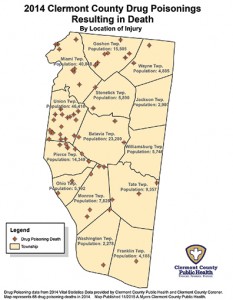 Following the national and state trend, Clermont County is seeing a rise in the number of drug overdose deaths. In 2014, 68 drug overdose deaths were reported in the county, compared to 43 in 2013 (data provided by the Clermont County Coroner’s Office; data from 2015 is not yet available). Statewide, Ohio saw an increase from 2110 to 2482 overdose deaths between 2013 and 2014, according to data from the Ohio Department of Health.
Following the national and state trend, Clermont County is seeing a rise in the number of drug overdose deaths. In 2014, 68 drug overdose deaths were reported in the county, compared to 43 in 2013 (data provided by the Clermont County Coroner’s Office; data from 2015 is not yet available). Statewide, Ohio saw an increase from 2110 to 2482 overdose deaths between 2013 and 2014, according to data from the Ohio Department of Health.
Michelle Lydenberg, injury prevention coordinator for Clermont County Public Health (CCPH) says the rise in overdose deaths can be attributed to several factors. “Many of these overdose deaths are the result of the users being alone while using, not calling 9-1-1 soon enough, or using multiple substances at the same time,” said Lydenberg. Heroin, an increasingly popular illicit drug can also be attributed to the rise in overdose deaths in the county and throughout Ohio. “Many individuals became addicted to prescription drugs that are chemically very similar to heroin. With new legislation aimed at reducing the number of prescription pain medications being dispensed, heroin has become a less expensive, and easier to obtain alternative to prescription medication,” said Lydenberg.
“The opiate epidemic is one of the top health concerns currently impacting Clermont County residents. Addiction is a disease that needs to be addressed through prevention and treatment, just like any other chronic disease,” said Julianne Nesbit, health commissioner with CCPH. To combat this epidemic, the Clermont County Opiate Task Force was formed in 2013. The task force consists of several local agencies, first responders, and community stakeholders.
“The task force promotes education for prescribers on tools for safely prescribing medication; facilitates increased access to naloxone, a substance that can reverse the effects of an overdose; promotes treatment options to people with substance abuse disorders; and encourages methods of prevention,” said Lydenberg.
Thanks to the task force, naloxone, sometimes known as Narcan, is being distributed to first responders and other community members. To date, the Clermont Recovery Center, which is part of the task force, has distributed nearly 400 naloxone kits. The Clermont County Sheriff’s Office now carries the medication in their vehicles, and has used it to reverse 35 overdoses. “Even though naloxone can successfully reverse an overdose, it only does so for a period of 30-90 minutes, so calling 9-1-1 if someone is experiencing an overdose is still crucial,” said Lydenberg.
She added, “The addiction epidemic has affected families of all backgrounds.” Families or friends of those struggling with an addiction can call the Clermont County crisis hotline at 513-528-SAVE (7283). Lydenberg also recommends that those who have a friend or loved one who is battling addiction should familiarize themselves with the signs of an overdose, and view Clermont County Public Health’s website www.ccphohio.org for more resources.
